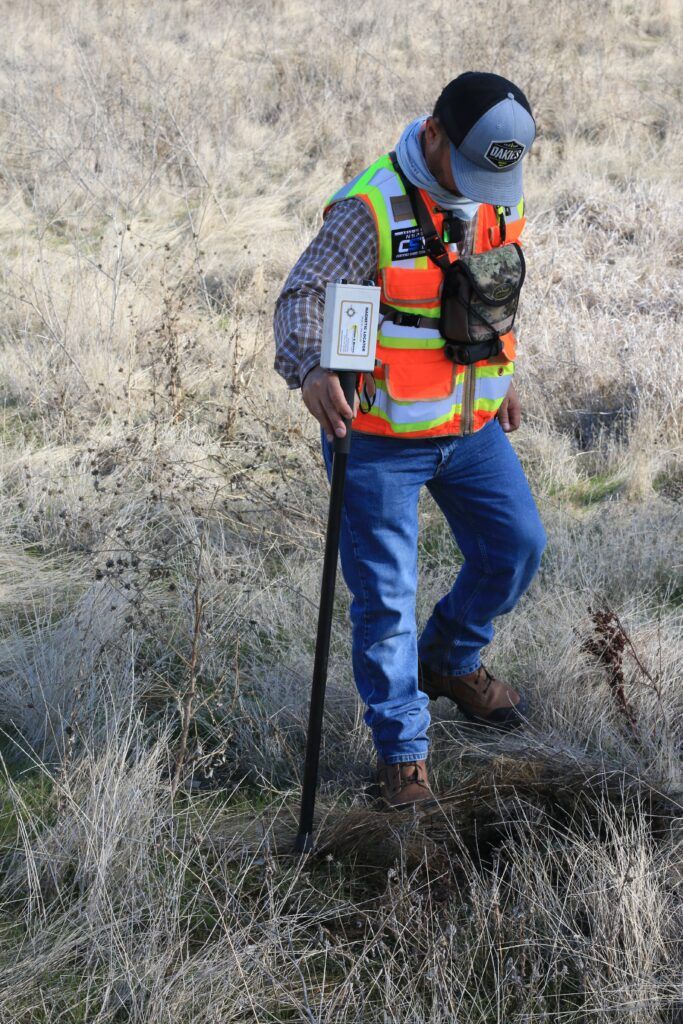- The Importance of Land Surveys
- Exploring Different Types of Land Surveys
- Boundary Surveys: Determining Property Lines
- ALTA/NSPS Land Surveys: In-Depth Property Evaluations for Commercial Purposes
- Topographic Surveys: Understanding Elevation and Terrain
- Construction Surveys: Assistance for Building Projects
- Mortgage Surveys: Ensuring Lender Protection
- Subdivision Surveys: Dividing Land into Smaller Parcels
- New Construction Surveys: Verifying Compliance and Accuracy
- Conducting a Land Survey on Your Property
- Understanding the Costs of Land Surveys
- Frequently Asked Questions about Land Surveys
- Final Thoughts
What Is a Land Survey?
Click here to browse our Real Estate Agent Directory and contact top-rated agents in your area!

Land surveys are a significant part of real estate and property ownership. They help resolve boundary disputes, facilitate real estate transactions, and ensure mortgage and title requirements compliance. Surveys also assist in utility installations, subdivisions, development projects, and updating existing surveys.
Understanding different types of land surveys is essential for property owners, home buyers, and real estate agents. Boundary surveys determine property lines, ALTA/NSPS surveys provide detailed property evaluations, and topographic surveys focus on elevation and terrain.
Construction, mortgage, subdivision, and new construction surveys serve specific purposes in many real estate transactions. Professional land surveyors are essential in conducting accurate and reliable surveys. When you are selling land, it is a must-have document.
Let’s dig into what you should know.
The Importance of Land Surveys
A proper land survey is essential for several reasons, ensuring accurate boundary delineation and property documentation. Understanding the importance of land surveys can help property owners navigate legal matters, real estate transactions, and development projects effectively.
Resolving Property Boundary Disputes through Land Surveys
Land surveys play a critical role in resolving property boundary disputes. Surveys provide clear evidence of property lines by accurately measuring and mapping the boundaries. Additionally, accurate land surveys help to resolve disagreements between neighboring landowners.
Land Surveys for Real Estate Transactions
Conducting land surveys is often needed in home sales. Buyers and sellers require accurate information about property boundaries, encroachments, and easements to make informed decisions.
A comprehensive survey ensures that all parties understand the property clearly.
Land Surveys for Mortgage and Title Purposes
Property surveys are also essential for mortgage lenders and title insurers in assessing risks and protecting their interests. A survey verifies the property’s dimensions, detects discrepancies, and ensures the legal description matches the physical boundaries.
The surveys also provide the necessary information for issuing a title insurance policy.
Land Surveys for Utility Installations
Accurate property boundaries and topography information are crucial when planning utility installations. Gas, water, or sewer lines benefit from precise locations. Land surveys help utility companies avoid encroachments, plan routes effectively, and ensure infrastructure installations comply with state and local regulations.
Land Surveys for Subdivision and Development
Whether subdividing land or developing a property, land surveys are fundamental. They help determine the precise measurements and configurations of the new lots, ensuring compliance with zoning regulations and avoiding potential issues in the future.
Developers rely on surveys to create accurate site plans and manage the development process effectively.
Updating Existing Land Surveys
Over time, land boundaries may change due to natural or human factors. Updating existing property surveys helps owners stay informed about any modifications. A property survey allows owners to maintain accurate records and address potential issues.
An updated survey is recommended when making significant improvements to your home, such as an addition.

Exploring Different Types of Land Surveys
Several different types of land surveys serve specific purposes in property management and development. Real Estate agents should have a general understanding of the various types of surveys. Gaining this knowledge can help guide buyers and sellers who need it. In addition, buyers and sellers should know the details of the property so that they can accurately make decisions.
Let’s examine some of the most common types of land surveys:
Boundary Surveys: Determining Property Lines
A boundary survey determines the lines and corners of a piece of land. It is crucial for identifying the exact boundaries of a property, settling boundary disputes, and establishing legal ownership.
Boundary surveys involve measuring and mapping the property lines, marking the corners, and documenting violations. It is one of the more common forms of property surveys.
ALTA/NSPS Land Surveys: In-Depth Property Evaluations for Commercial Purposes
An ALTA/NSPS land survey is a comprehensive property evaluation that follows the standards of the American Land Title Association (ALTA) and the National Society of Professional Surveyors (NSPS).
Commercial real estate transactions often require these surveys. They provide detailed information about boundaries, easements, encroachments, and other relevant factors influencing the property’s value.
Topographic Surveys: Understanding Elevation and Terrain
Topographic surveys show a property’s natural and manufactured features, including elevation changes, contours, vegetation, water bodies, and structures. It is essential for land development projects, providing valuable information for engineering, architectural design, and site planning.
Real Estate agents that work with new construction will be familiar with these kinds of surveys. Topographic surveys help assess the suitability of the land for specific purposes and ensure proper drainage and construction.
Construction Surveys: Assistance for Building Projects
Construction surveys are conducted during various stages of building projects to ensure the implementation of the design plans. They mark the desired locations of structures, utilities, and other features and verify their compliance with the design specifications.
Construction surveys also help prevent errors and ensure the project moves along smoothly. Land survey apps can now be used to make the process more efficient.
Mortgage Surveys: Ensuring Lender Protection
Lenders order mortgage surveys to figure out potential risks associated with a property. Buyers and sellers should understand these are mandatory in real estate transactions. These surveys identify encroachments, easements, or other potential issues affecting the property’s marketability.
Mortgage surveys provide lenders with the necessary reassurance before approving a loan. It is the most common form of survey in a real estate transaction.
Subdivision Surveys: Dividing Land into Smaller Parcels
Subdivision surveys occur when landowners intend to divide their property into smaller parcels. These surveys determine the boundaries and configurations of the new lots, ensuring compliance with local zoning and subdivision regulations.
A developer or builder will use this type of survey to understand how many lots they will get from a piece of land. Subdivision surveys are essential for property owners looking to sell individual lots or develop multiple properties.
New Construction Surveys: Verifying Compliance and Accuracy
If you decide to build a house, surveys are a must. Before a building project, surveys are done to verify that the constructed structures align with the approved plans and meet local regulations.
These surveys measure and document the constructed elements’ location, elevation, and dimensions. Doing so ensures compliance with the design and regulatory standards.
By understanding the types of surveys, property owners can make informed decisions, protect their investments, and ensure compliance with legal requirements throughout various stages of development.

Conducting a Land Survey on Your Property
There are several essential steps when performing a land survey on your property. Ensuring the accuracy and reliability of the survey requires careful planning and collaboration with a professional land surveyor.
There are critical components you should understand about this process.
Choosing a Professional Land Surveyor
Hiring a reputable and experienced professional land surveyor is the first step. It is crucial to choose someone who is licensed and knowledgeable about local regulations and procedures. Ensure you research different surveying firms, read reviews, and ask for recommendations from trusted sources.
While a land surveyor does many things, clearly understanding your goals and providing insights is essential.
Gathering Necessary Information for the Survey
Before having a survey, get all the relevant information about your property. This includes property records, deeds, previous surveys, and other documentation that may provide insights into the property’s history and boundaries.
Providing this to the surveyor will help them understand the survey’s objectives better.
Understanding the Survey Process
Understanding what they do is essential once the surveyor is chosen and all necessary information is collected. The surveyor will visit the property and use various tools and techniques to accurately measure and map the land’s boundaries, elevations, and other relevant features. This may involve using advanced surveying equipment, such as GPS systems and total stations, to ensure precision and reliability.
Knowing the surveyor’s methods and approach will help you stay informed and engaged.
Interpreting the Survey Results
The surveyor will provide detailed results and findings when the survey is complete. It is essential to review and interpret these results carefully. The surveyor typically offers a comprehensive report, including detailed maps, measurements, property boundaries, and feature descriptions.
Carefully examine this information, as it will provide valuable insights into your property. You can use it for various purposes, such as resolving boundary disputes or planning future developments.
Understanding the Costs of Land Surveys
Factors Affecting Survey Costs
Several factors contribute to the costs associated with land surveys. These factors include:
- Nature of the survey: The complexity and scope of the survey will impact its overall cost. Surveys requiring extensive measurements, detailed analysis, or specialized equipment are likely more expensive.
- Property size: Larger properties generally require more time and resources to survey, resulting in higher costs.
- Accessibility and terrain: Difficult-to-reach or rugged landscapes may necessitate additional effort and equipment, increasing the overall cost of the survey.
- Location: Surveys conducted in urban areas may have higher costs due to congested surroundings, underground utilities, or complex legal requirements.
- Additional services: If other services such as legal consultations, expert witness testimony, or documentation preparation are required, they may incur additional fees.
Typical Price Ranges for Different Types of Land Surveys
The cost of a land survey can vary depending on the specific type of survey required. While exact prices can vary, here are some standard price ranges for different types of land surveys:
- Boundary Surveys: Boundary surveys for determining property lines typically range between $500 and $4,000.
- ALTA/NSPS Surveys: These comprehensive evaluations for commercial purposes often range from $2,500 to $10,000.
- Topographic Surveys: Topographic surveys assessing elevation and terrain generally cost between $1,000 and $5,000.
- Construction Surveys: Surveys for construction projects typically fall within the range of $1,000 to $5,000, depending on the size and complexity of the project.
- Mortgage Surveys: These surveys, required by lenders for mortgage purposes, can range from $300 to $1,000.
- Subdivision Surveys: Surveys for dividing land into smaller parcels may range from $1,500 to $10,000, depending on the size and complexity of the subdivision.
- New Construction Surveys: Verifying compliance and accuracy for new construction projects can cost between $1,000 and $5,000.
It’s important to note that these are general price ranges, and the actual cost of a land survey can vary based on various factors.
Frequently Asked Questions about Land Surveys
What is the difference between a boundary survey and a topographic survey?
A boundary survey determines the precise location of property lines and corners. It establishes the legal boundaries of a piece of land. On the other hand, a topographic survey focuses on capturing the land’s contours, elevations, and features, including trees, structures, and bodies of water.
It provides valuable information about the terrain, which is helpful for engineering and development purposes.
What should I do if the survey reveals discrepancies with my property lines?
It is recommended to consult with a professional land surveyor if the survey reveals discrepancies or conflicts with your property lines.
They can provide expertise in interpreting the survey results and resolving any issues. In some cases, it may be necessary to undertake additional surveys or legal procedures to address the discrepancies and establish accurate boundaries.
When buying a home, are land surveys required?
It is not always a legal requirement to have land surveys. However, experts highly recommend conducting a survey, especially if there are concerns about property boundaries or potential encroachments.
A survey provides valuable information that can help protect your investment and prevent future disputes.
Can I conduct a land survey on my own?
While it is possible to analyze parcel maps and gather basic information for personal purposes, conducting a land survey is not recommended. Land surveying requires specialized knowledge, equipment, and expertise to ensure accuracy and compliance with legal standards. Hiring a professional land surveyor is the best approach to obtaining reliable and legally recognized survey results.
How often should I update my land survey?
The frequency of updating a land survey depends on various factors, such as changes in property boundaries, development activities, or legal requirements. Experts recommend correcting a land survey whenever significant changes occur on the property, such as constructing new buildings, altering property lines, or making improvements that affect the land’s topography.
Asking a professional land surveyor can help determine the appropriate timing for updating your survey.
Final Thoughts
As you can see, there are several different types of property surveys. Each has a distinct use and purpose. Land surveys are a critical element of real estate transactions, so having an understanding of these surveys will help you make informed decisions.




